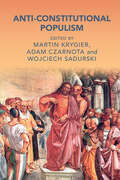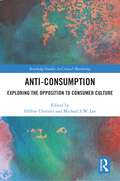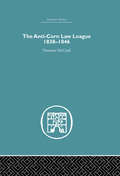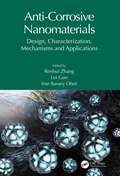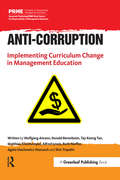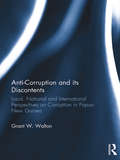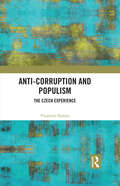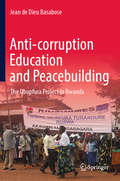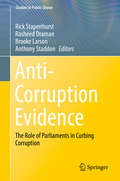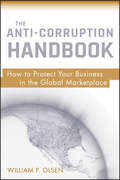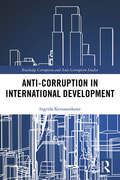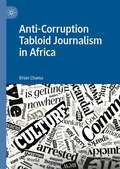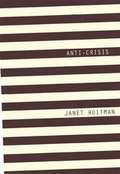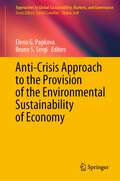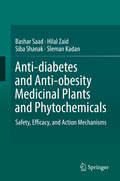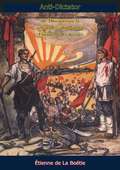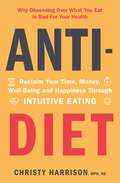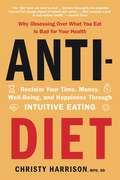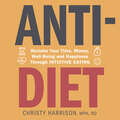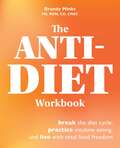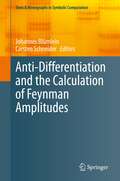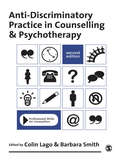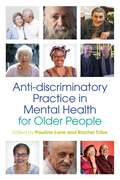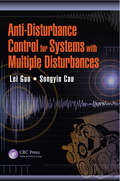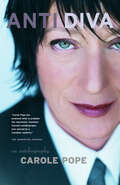- Table View
- List View
Anti-Constitutional Populism (Cambridge Studies in Law and Society)
by Martin Krygier Adam Czarnota Wojciech SadurskiAround the world, populist parties have sprung up in formerly and formally liberal-democratic polities, challenging their existing political parties and leaders, and frequently overwhelming them. These challenges and successes were rarely predicted, arriving so soon after the wave of liberal democratic and constitutional enthusiasms, proclamations and institution-building which peaked in the 1990s. Bringing together scholars from law, political science and philosophy, this collection explores the character of contemporary populisms and their relationships to constitutional democracy. With contributors from around the world, it offers a diverse range of nuanced perspectives on populism as a global phenomenon. Using comparative and multi-disciplinary techniques, this book considers the specifics and similarities of populisms, and raises general questions about their nature and potential futures.
Anti-Consumption: Exploring the Opposition to Consumer Culture (Routledge Studies in Critical Marketing)
by Hélène Cherrier Michael S W LeeIn this edited volume, the leading scholars in the field engage with consumers, marketers, corporations and policymakers as well as space dynamics and network formation to provide an in-depth examination of anti-consumption: a voluntary behavioural inclination to minimise rather than grow, to decelerate and simplify and to reduce the unnecessary exploitation of resources fuelled by consumer culture. This book does not place anti-consumption on the high moral ground but rather demonstrates its complexity to spur innovative and critical thinking on how people, organisations, businesses and governments can treat consumption more as a necessity for survival than as a tool for self-expression, pleasure and economic growth. The first part of this book looks at anti-consumption from a diversity of perspectives. It analyses voluntary simplicity, a self-motivated engagement in consumption reduction, and boycotting, a politically-motivated reaction against unacceptable corporate practices, as distinct manifestations of anti-consumption that nonetheless remain rooted in the logic of the market. Paving the way to critical perspectives on the interface between anti-consumption, people and the environment, the second part of the book projects anti-consumption to issues of waste production and provides possible answers to global challenges of resources depletion, social inequalities and global warming. In this section, anti-consumption is critically assessed as an actor of change, both in terms of social change and paradigm change. To move the field forward, the third part of this book presents several theoretical frameworks that help set a roadmap for future research. Anti-Consumption will be of direct interest to scholars and researchers within the fields of marketing, consumer research, business studies, environmental studies and sustainability. It will also be of value to those researching the economics and/or sociology of markets.
The Anti-Corn Law League: 1838-1846
by Norman McCordAlthough the Anti-Corn Law league played a most important part in the politics of the 1840's, there is no modern study of its activities and organization. Based on several years work on the original sources, as well as papers belonging to George Wilson, President of the League for most of its life, this book sheds light on the internal history and organization of the League. Written from a political perspective, Dr McCord describes the origin, organization and activities of the League, together with its effect on the contemporary political scene, and as such, fills an important gap in our knowledge of the political history of early Victorian England. At the same time, the book provides an analysis of an unusually well-documented political pressure group, making it a most welcome addition to literature for historians and economic historians, as well as students of political science. This book was first published in 1958.
Anti-Corrosive Nanomaterials: Design, Characterization, Mechanisms and Applications
by Renhui Zhang Lei Guo Ime Bassey ObotCorrosion is a great challenge in many industries, especially in the automotive, aerospace, and oil and gas industries, with conservative estimations accounting for losses of around 2.2 trillion US dollars per year in the United States alone. Providing a comprehensive overview of the history and development of nanomaterials, this book discusses various practices for protection against corrosion. Key Features: Provides a comprehensive and updated review of major innovations in the field of nanomaterials in industrial, corrosion, and environmental science and engineering Encompasses design, characterization, mechanism, and application of nanomaterials from different strategies on the efficacy and major challenges associated with successful scaleup designing Essential reference for present and future research in nanomaterials Includes relevant aspects of organic and inorganic nanomaterials, hybrid nanomaterials, and nanocoatings in anticorrosion applications Coalescing a wide range of research on nanomaterials and anticorrosion practices, this book is of particular appeal to students, industry professionals, and academics.
Anti-Corruption: Implementing Curriculum Change in Management Education (The Principles for Responsible Management Education Series)
by Wolfgang Amann Ronald Berenbeim Tay Keong Tan Matthias Kleinhempel Alfred Lewis Ruth Nieffer Agata Stachowicz-Stanusch Shiv TripathiSuccessful businesses are built on trust. Employees and colleagues need to trust one another and they need to deserve and receive trust from customers and suppliers. Anti-Corruption provides resources for building trust through the implementation of comprehensive guidelines on how to professionalize ethics and anti-corruption education worldwide in a variety of classroom settings. It is written and tested by highly experienced program directors, deans and professors, in how to adopt, adapt and develop best teaching practice. It highlights successful patterns, details illustrative case studies and offers clear, hands-on recommendations. Anti-Corruption enables business schools, management-related academic institutions, and Executive Training Programs to embed curriculum change quickly to achieve positive outcomes. It enables degree programs and executive education programs to achieve global standards that will be widely followed.
Anti-Corruption and its Discontents: Local, National and International Perspectives on Corruption in Papua New Guinea
by Grant W. WaltonThe fight against corruption is now a core part of development policy and practice. Some call these efforts a ‘war on corruption’. What does this so-called ‘war’ mean for developing countries? And how do international perspectives on corruption relate to local and national concerns? This book examines the relevance of anti-corruption discourse in Papua New Guinea (PNG), one of the most culturally rich and ‘corrupt’ countries on earth. Despite increased international, national and local efforts to address corruption over the past two decades, many fear that levels of corruption continue to rise largely unabated. Some believe that the mismatch between international, national and local assumptions regarding the nature of corruption and how it should be addressed is at the heart of the issue. International anti-corruption initiatives stress ‘zero-tolerance’ and try to strengthen formal state-based institutions. However, many people in PNG are more concerned about maintaining social relationships than following state laws and rules. This book critically examines the implications of the anti-corruption agenda and the collision of international, national and local perspectives. In doing so it provides a diagnostic on international assumptions about corruption and how it should be fought in developing countries, offering surprising and important lessons. This book is essential reading for scholars and students of Development Studies, Geography, Political Studies and Economics, as well as practitioners and policy makers working in development.
Anti-Corruption and Populism: The Czech Experience
by Vladimír NaxeraThis book assesses what corruption means for populists, and the anti-corruption rhetoric of populist actors. The author uses the case study of Czech politicians to show how populist politicians exploit the notion of corruption in their communication. Using many examples of different political statements (by presidents, party leaders, MPs, etc.), the populist discourse of corruption is discussed in the context of other discourses presented in Czech politics. The author analyses both Czech (not only populist) political party election manifestos and the political communication on social media from Czech anti-establishment and populist political parties (ANO, Freedom and Direct Democracy, and Pirates). Based on an extensive conceptual framework the book also focuses on whether mainstream parties respond to the success of populists by adopting populist anti-corruption rhetoric themselves and the similarities and differences between the approaches they adopt. Understanding the processes of more than 30 years of Czech post-communist politics, and offering a theoretical and methodological framework applicable to research conducted in other contexts, this book will appeal to scholars of political science, sociology and economics.
Anti-corruption Education and Peacebuilding: The Ubupfura Project in Rwanda
by Jean de BasaboseThis study explores corruption in Rwanda and highlights the necessity of developing anti-corruption education as a way of combating corruption. It argues that an effective campaign against corruption should consider promoting anti-corruption education with the aim of enabling present and future generations to maintain and live out the Ubupfura (meaning "trust/respect") ethical values. Considering the link between anti-corruption and peacebuilding efforts, as explained in this study, it is underlined that continuous efforts to raise such generations could undoubtedly move Rwandan society toward a sustainable peace. Peacebuilders, anti-corruption agents, and public policymakers are the primary beneficiaries of the study.
Anti-Corruption Evidence: The Role of Parliaments in Curbing Corruption (Studies in Public Choice #34)
by Brooke Larson Rick Stapenhurst Rasheed Draman Anthony StaddonThis book discusses parliamentary oversight and its role in curbing corruption in developing countries. Over the past decade, a growing body of research at the global and regional levels has demonstrated that parliamentary oversight is an important determinant of corruption and that effective oversight of public expenditure is an essential component of national anti-corruption strategies and programs. However, little research has been undertaken at the country level regarding how parliamentary oversight is undertaken, which oversight mechanisms are effective or on how national parliaments interact with other anti-corruption stakeholders. This book presents the results of a new large-scale, quantitative analysis which identifies the mechanisms through which institutional arrangements impact corruption, specifically through country case studies on the Caribbean region, Ghana, Myanmar, Nigeria, Tanzania, and Uganda. Addressing a gap in scholarly knowledge while presenting practical policy advice for parliaments and for anti-corruption assistance agencies, this book will be of use to scholars interested in development, anti-corruption, public finance, as well as members of parliament, anti-corruption practitioners, and organizations working in parliamentary strengthening.
The Anti-Corruption Handbook
by William P. OlsenThe global marketplace can be risky business.Get the knowledge and tools you need to get a competitive advantage in the global markets with The Anti-Corruption Handbook: How to Protect Your Business in the Global Marketplace.Authoritative and timely, this essential guide equips you--whether you are an auditor, CFO, general counsel, internal auditor, compliance officer, or forensic accountant--to readily identify the signs of corruption and fraud in the global marketplace and successfully investigate it.This practical guide presents a clear picture of the world of global business corruption, with discussion of:The U.S. laws governing corruptionThe pitfalls of emerging marketsThe key to unmasking corrupt activityReducing risk through technologyIntellectual property theftThe current state of anti-money laundering in the global marketplaceHow to investigate allegations of corruptionCosts of corruption for industries, economies, and countriesWith detailed coverage of the evolution and accounting provisions of the Foreign Corruption Practices Act (FCPA), The Anti-Corruption Handbook: How to Protect Your Business in the Global Marketplace sheds light on the issues and threats that your business faces, the risks of doing business in the global marketplace, and the precautions your organization must take to deter such activity from occurring in the first place.
Anti-Corruption in International Development (Routledge Corruption and Anti-Corruption Studies)
by Ingrida KerusauskaiteCorruption is linked to a wide range of developmental issues, including undermining democratic institutions, slowing economic development and contributing to government instability, poverty and inequality. It is estimated that corruption costs more than 5 per cent of global GDP, and that more than one trillion US dollars are paid in bribes each year. This book unpacks the concept of corruption, its political and ethical influences, its measurement, commitments to combat corruption and ways that this is being attempted. Building on the research on the nature, causes and consequences of corruption, this book analyses international anti-corruption interventions in particular. It discusses approaches to focus efforts to tackle corruption in developing countries on where they are most likely to be successful. The efforts of the UK are considered as a detailed case study, with comparisons brought in as necessary from other countries’ and multilateral institutions’ anti-corruption efforts. Bridging a range of disciplines, Anti-Corruption in International Development will be of interest to students and scholars of international development, public administration, management, international relations, politics and criminal justice.
Anti-Corruption Tabloid Journalism in Africa
by Brian ChamaThis book studies the role of tabloid newspapers in exposing corruption and embezzlement in Africa. It makes a timeless, original contribution to the field by examining tabloid journalism practices and anti-corruption forces that have not yet been introduced to Afrocentric journalism scholarship. Defining tabloid journalism practice as an infotainment genre, the book examines corruption exposure by tabloids in Arabic, Portuguese and French speaking countries across Africa, making it a unique addition to the field. In doing so, it also builds an understanding of the evolution of anti-corruption tabloid journalism in Africa and gains insights into the relationship between the anti-corruption actions of the state and the anti-corruption reporting by tabloid journalists focusing on major corruption scandals. Providing evidence of the successes and struggles of journalistic practice in Africa, the book concludes by providing a synthesis of the emerging patterns and divergences from the cases analysed, looking to the future of corruption in the continent and the role of tabloid journalism in uncovering and challenging it.
Anti-Crisis
by Janet RoitmanCrisis is everywhere: in Iraq, Afghanistan, Syria, and the Congo; in housing markets, money markets, financial systems, state budgets, and sovereign currencies. In Anti-Crisis, Janet Roitman steps back from the cycle of crisis production to ask not just why we declare so many crises but also what sort of analytical work the concept of crisis enables. What, she asks, are the stakes of crisis? Taking responses to the so-called subprime mortgage crisis of 2007-2008 as her case in point, Roitman engages with the work of thinkers ranging from Reinhart Koselleck to Michael Lewis, and from Thomas Hobbes to Robert Shiller. In the process, she questions the bases for claims to crisis and shows how crisis functions as a narrative device, or how the invocation of crisis in contemporary accounts of the financial meltdown enables particular narratives, raising certain questions while foreclosing others.
Anti-Crisis Approach to the Provision of the Environmental Sustainability of Economy (Approaches to Global Sustainability, Markets, and Governance)
by Elena G. Popkova Bruno S. SergiThis book focuses on the notion of the environmental sustainability of the economy. The Sustainable Development Goals, formulated by the UN, led to the formation of a concept of the environmental sustainability of the economy. This concept implies the harmony of economy and environment, achieved due to the support for the SDGs in the economy. This book is original due to its reconsidering the environmental sustainability of the economy from the position of crises. The theoretical significance of the book consists in the development of an anti-crisis approach to the provision of the environmental sustainability of the economy: responsible nature use based on digital markets and smart governance. The proprietary approach allows for the comprehensive description of the potential of the leading technologies—artificial intelligence (AI), robots, the Internet of Things (IoT), and blockchain—to support—during their use in smart governance—crisis management of the environmental sustainability of economy.The book’s practical significance is due to the description and detailed discussion of the modern international experience of responsible nature use given the specifics of developed and developing countries. The anti-crisis approach to the provision of the environmental sustainability of the economy is based on digital markets: FinTech, EdTech, GovTech, AgroTech, and EnergyTech, the practice of which is described in the book with the help of multiple examples from the international experience and case studies. The book is aimed at scholars who study environmental economics. In this book, they find an innovative view of the environmental sustainability of the economy in its close connection with economic crises.
Anti-diabetes and Anti-obesity Medicinal Plants and Phytochemicals: Safety, Efficacy, and Action Mechanisms
by Bashar Saad Hilal Zaid Siba Shanak Sleman KadanThis work presents a systematic review of traditional herbal medicine and their active compounds, as well as their mechanism of action in the prevention and treatment of diabetes and obesity. The side effects and safety of herbal-derived anti-diabetic and anti-obesity phytochemicals are detailed in depth, and the text has a strong focus on current and future trends in anti-diabetic medicinal plants. This unique and comprehensive text is the only current book on the market focusing exclusively on medicinal plants used to combat obesity and diabetes. An introductory chapter focuses on diabetes and obesity and introduces the major causes and main treatments of this increasing epidemic in modern society. Readers are then introduced to medicinal plants, including details on their therapeutic aspects, plus side effects and safety. Following chapters focus on anti-diabetic and anti-obesity medicinal plants, as well as phytogenic natural products in the treatment of each. The text closes by focusing on present and future trends and challenges in these medicinal plants. Anti-diabetes and Anti-obesity Medicinal Plants and Phytochemicals: Safety, Efficacy, and Action Mechanisms is a much-needed and truly original work, finally presenting in one place all the necessary information on medicinal plants used in conjunction with obesity and diabetes prevention.
Anti-Dictator: the Discours sur la servitude volontaire of Étienne de La Boétie
by Étienne de La BoétieThis famous essay asserts that tyrants have power because the people give it to them. La Boetie linked together obedience and domination, a relationship which would be later elaborated by anarchist thinkers. By advocating a solution of simply refusing to support the tyrant, he became one of the earliest advocates of civil disobedience and nonviolent resistance. “To him, the great mystery of politics was obedience to rulers. Why in the world do people agree to be looted and otherwise oppressed by government overlords? It is not just fear, Boetie explains in “The Discourse on Voluntary Servitude,” for our consent is required. And that consent can be non-violently withdrawn.”—Lew Rockwell
Anti-Diet: Reclaim Your Time, Money, Well-Being and Happiness Through Intuitive Eating
by Christy HarrisonA how-to guide to reclaiming your time, money, health and happiness in our toxic diet culture.In Anti-Diet, Christy Harrison takes on diet culture and the multi-billion-pound industries that profit from it, exposing all the ways it robs people of their time, money, health and happiness. It will turn what you think you know about health and wellness upside down, as Harrison explores the history of diet culture, how it's infiltrated the health and wellness world, how to recognise it in all its sneaky forms, and how letting go of efforts to lose weight or eat 'perfectly' actually helps to improve people's health - no matter their size. Drawing on scientific research, personal experience and stories from patients and colleagues, Anti-Diet provides a radical alternative to diet culture, and helps readers reclaim their bodies, minds, and lives so they can focus on the things that truly matter.'Please read this book! Anti-Diet is the book to end all diet books, and will be a game changer for so many people. Christy is an expert on this subject and leaves no stone unturned in exposing how insidious and harmful diet culture is - and teaching readers how to opt-out of the madness.' - Caroline Dooner, author of The F*ck It Diet 'A huge burden has been lifted: I no longer have to revise my first book to reflect current understanding! Christy Harrison beat me to it. I'm blown away by how good Anti-Diet is. Using a social justice lens, well-researched and smart science, captivating storytelling, and practical advice, this book will help you reclaim your life from the throttle of diet culture.'- Linda Bacon, author of Health at Every Size, co-author of Body Respect'Most diet and wellness books claim to address mind, body, and spirit, but in fact they are just about body. Thank goodness for Christy Harrison, whose empathetic book reveals oppressive diet culture for what it truly is, and offers a genuinely holistic alternative.' - Alan Levinovitz, author of The Gluten Lie
Anti-Diet: Reclaim Your Time, Money, Well-Being, and Happiness Through Intuitive Eating
by Christy HarrisonReclaim your time, money, health, and happiness from our toxic diet culture with groundbreaking strategies from a registered dietitian, journalist, and host of the "Food Psych" podcast.68 percent of Americans have dieted at some point in their lives. But upwards of 90% of people who intentionally lose weight gain it back within five years. And as many as 66% of people who embark on weight-loss efforts end up gaining more weight than they lost. If dieting is so clearly ineffective, why are we so obsessed with it?The culprit is diet culture, a system of beliefs that equates thinness to health and moral virtue, promotes weight loss as a means of attaining higher status, and demonizes certain ways of eating while elevating others. It's sexist, racist, and classist, yet this way of thinking about food and bodies is so embedded in the fabric of our society that it can be hard to recognize. It masquerades as health, wellness, and fitness, and for some, it is all-consuming. In Anti-Diet, Christy Harrison takes on diet culture and the multi-billion-dollar industries that profit from it, exposing all the ways it robs people of their time, money, health, and happiness. It will turn what you think you know about health and wellness upside down, as Harrison explores the history of diet culture, how it's infiltrated the health and wellness world, how to recognize it in all its sneaky forms, and how letting go of efforts to lose weight or eat "perfectly" actually helps to improve people's health -- no matter their size. Drawing on scientific research, personal experience, and stories from patients and colleagues, Anti-Diet provides a radical alternative to diet culture, and helps readers reclaim their bodies, minds, and lives so they can focus on the things that truly matter.
Anti-Diet: Reclaim Your Time, Money, Well-Being and Happiness Through Intuitive Eating
by Christy HarrisonA how-to guide to reclaiming your time, money, health and happiness in our toxic diet culture.In Anti-Diet, Christy Harrison takes on diet culture and the multi-billion-pound industries that profit from it, exposing all the ways it robs people of their time, money, health and happiness. It will turn what you think you know about health and wellness upside down, as Harrison explores the history of diet culture, how it's infiltrated the health and wellness world, how to recognise it in all its sneaky forms, and how letting go of efforts to lose weight or eat 'perfectly' actually helps to improve people's health - no matter their size. Drawing on scientific research, personal experience and stories from patients and colleagues, Anti-Diet provides a radical alternative to diet culture, and helps readers reclaim their bodies, minds, and lives so they can focus on the things that truly matter.(P) 2019 Hachette Audio
The Anti-Diet Workbook: Break the Diet Cycle, Practice Intuitive Eating, and Live with Total Food Freedom
by Brandy MinksDitch harmful fad diets and weight cycling, learn to respect your body, and eat intuitively with this easy-to-use workbook.Have you ever felt trapped in the diet cycle? Do you find yourself swinging back and forth between binging and dieting? Does your weight fluctuate regularly? New studies have shown the incredible negative impacts dieting and weight-cycling have on the body. With The Anti-Diet Workbook, you can regain control over your eating habits and get your life back! Inside you&’ll find: Information on the harms of dieting and the weight-loss industry Key principles for intuitive eating Space to track your journey from dieter to anti-dieter And much more! This book is a great first step in reevaluating your relationship with food and taking control of your health. Written by a registered dietician nutritionist and intuitive eating expert, The Anti-Diet Workbook will help you build habits for a lifetime of health, happiness, and food freedom.
Anti-Differentiation and the Calculation of Feynman Amplitudes (Texts & Monographs in Symbolic Computation)
by Johannes Blümlein Carsten SchneiderThis volume comprises review papers presented at the Conference on Antidifferentiation and the Calculation of Feynman Amplitudes, held in Zeuthen, Germany, in October 2020, and a few additional invited reviews. The book aims at comprehensive surveys and new innovative results of the analytic integration methods of Feynman integrals in quantum field theory. These methods are closely related to the field of special functions and their function spaces, the theory of differential equations and summation theory. Almost all of these algorithms have a strong basis in computer algebra. The solution of the corresponding problems are connected to the analytic management of large data in the range of Giga- to Terabytes. The methods are widely applicable to quite a series of other branches of mathematics and theoretical physics.
Anti-Discriminatory Practice in Counselling & Psychotherapy (Professional Skills for Counsellors Series)
by Barbara Smith Mr Colin LagoAnti-Discriminatory Practice in Counselling and Psychotherapy is a groundbreaking text which identifies the ease with which individuals can be disadvantaged merely on the basis of their gender, race, culture, age, sexuality or ability. Examining these and other areas of discrimination, leading experts highlight how vital it is for counsellors, psychotherapists - and others in the helping professions - to be aware of and engage with their own social, political and cultural attitudes, and how they must develop their skills as culturally sensitive, reflective practitioners if counselling is to be truly accessible to all members of society. This substantially revised and updated second edition now also includes chapters on working within an anti-discriminatory approach with: - refugees - people with mental health difficulties - people with disfigurement or visible differences. While each thought-provoking chapter now: - links theory to practice by providing case studies and extracts from therapeutic dialogues - assesses the most recent research findings - provides exercises for enhancing awareness and skills within each different domain or care setting - presents references for further recommended reading. Clearly written and accessible, Anti-discriminatory Practice in Counselling and Psychotherapy is an indispensable addition to the toolkit of everyone either training to be or practising in the counselling and psychotherapeutic professions.
Anti-discriminatory Practice in Mental Health Care for Older People
by Siobhan Spencer Rena Kydd-Williams Rachel Tribe Peter Cockersell Pauline Lane Musthafar Oladosu Matt Broadway-Horner Maria Castro Romero Ajit ShahExploring the key issues around anti-discriminatory practice for professionals working in mental health services, this book looks at ways to improve the health and social care of older people from minority and excluded communities. The chapters explore the issues involved in working with individuals from a range of minority groups, such as LGBT people, people with learning disabilities, people from black and minority ethnic communities, homeless people and people with dementia. The chapters cover important theory and research into discrimination, ageing and identity. Contributions from experts in the fields of mental health and working with minority groups provide practical insights into developing anti-discriminatory practice.There is also practical advice on culturally appropriate support for carers, cultural competency in end of life care, working with interpreters, and celebrating diversity, accompanied by supporting practical resources. This comprehensive book will provide mental health practitioners and students with an essential understanding of anti-discriminatory practice.
Anti-Disturbance Control for Systems with Multiple Disturbances (Automation and Control Engineering)
by Lei Guo Songyin CaoThe main focus of this monograph will be on the Enhanced Anti-Disturbance Control and filtering theory and their applications. In fact, the classical anti-disturbance control theory only considered one "equivalent" disturbance which is merged by different unknown sources. However, it is noted that along with the development of information obtaining and processing technologies, one can get more information or knowledge about various types of disturbances.
Anti Diva: An autobiography
by Carole PopeThroughout her career, Carole Pope has blazed a trail for the diva and anti-diva in all of us, and here she offers a no-holds-barred look at her adventures in the music scene – on the concert stage, in the recording studio, and in the bedroom. Known for ushering Canada from the punk movement of the 1970s to the new wave sound of the 1980s with Rough Trade, she candidly shares her thoughts on AIDS, sexuality and sexual politics, and the new breed of music divas that dominates the charts today.
